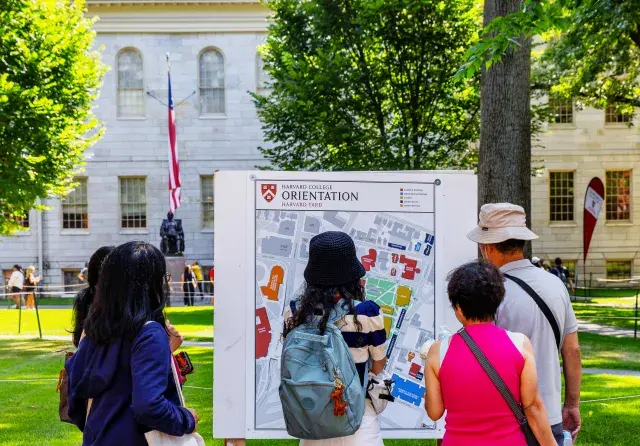-
House Foreign Affairs Members Call for Machado to Govern Venezuela - 21 mins ago
-
LAUSD help for nonwhite students hurts white students, suit alleges - 34 mins ago
-
Stocks Post Biggest Drop in Months as Tensions Over Greenland Mount - about 1 hour ago
-
Anti-Trump protesters join ‘Free America walkout’ in downtown L.A. - about 1 hour ago
-
‘God Is Very Proud’: Trump Marks Anniversary With a Victory Lap - 2 hours ago
-
An Adelanto mom went missing from a parking lot 20 years ago. The case went cold, until now - 2 hours ago
-
Another Train Crash in Spain Kills 1 and Hurts 37, Officials Say - 3 hours ago
-
Coyote makes astonishing swim to Alcatraz — the start of a prison-island pack? We asked experts - 3 hours ago
-
With Greenland, Trumpism Is Doomed Without Restraint - 3 hours ago
-
‘It’s nuts.’ This 4-year-old is getting death threats over NFL predictions - 3 hours ago
Trump Admin Plans Major Student Visa Change
The Trump administration is considering another change to student visas, which could limit or end their work or training opportunities after they complete their degrees.
An as-yet unpublished rule change from the Department of Homeland Security (DHS) suggests that the program known as Student Optional Practical Training (OPT) will be heavily modified, in part to address worries about American workers being “displaced.”
The move was appealing to those Newsweek spoke to who are seeking an end to the program, while advocates raised concerns about American innovation and growth.
“Any proposed rule aiming to restrict or end post-graduation Optional Practical Training (OPT) would be fundamentally short-sighted, as it directly undermines the U.S. overall ability to recruit and retain top global talent,” Miriam Feldblum, executive director of the Presidents’ Alliance on Higher Education and Immigration, told Newsweek. “OPT is what helps to ensure our position as the top destination for global international student talent.”
Newsweek reached out to DHS for comment via email.
Why It Matters
Student visa holders were an early target of the Trump administration as it set to crack down on pro-Palestinian protesters on college campuses, revoking their visas, and forcing some to leave, although this has now slowed.
The broader concern surrounding the 1.5 million foreign students in the U.S. centers on their entry into the labor market, a time when many believe American graduates are struggling to secure entry-level jobs.

What To Know
The planned rule does not provide much detail yet on how DHS intends to modify the OPT portion of the student visa, but it does offer a general outline of the goals of the change.
“The proposed rule will better align practical training to the goals and objectives of the program while providing more clarity to the public. The proposed rule will amend existing regulations to address fraud and national security concerns, protect U.S. workers from being displaced by foreign nationals, and enhance the Student and Exchange Visitor Program’s capacity to oversee the program,” the page on the Office of Information and Regulatory Affairs reads.
Addressing fraud and national security concerns has been a major reason cited by the Trump administration for its tightening of immigration laws and ramping up enforcement actions since January, so this language is not entirely new.
Protecting U.S. workers in the context of student visas potentially suggests that there are plans to limit F-1 visa holders’ employment pathways beyond their degrees.
In recent months, there has been growing concern that foreign workers are displacing Americans, particularly in tech jobs, and that graduates are being hardest hit. Employers have been repeatedly accused of preferring to hire foreign talent on H-1B visas or student visas, as they are seen as cheaper labor, in part due to tax incentives.
The OPT program is limited, however, as it only allows student visa holders to be employed for a finite period of time before they need to transition to a new visa. In Fiscal Year 2024, just under 110,000 student visa holders were on the payrolls of U.S. companies, with that figure likely to increase in 2025.
Advocates for the program argue that it should be codified into law, rather than cut back, in order to expand the job field that can take advantage of foreign-born, American-trained talent, which the country needs, such as in health care.
What People Are Saying
Anne Walsh, an attorney at Corporate Immigration Partners, told Newsweek: “These U.S.-trained, foreign-born STEM graduates may work in critical sectors including health care, cybersecurity, sustainable energy, and AI. From a study authored jointly by researchers from top universities, including Harvard and Stanford, we know that foreign-born graduates of U.S. STEM programs contribute disproportionately to U.S. patents, research breakthroughs, and tech development.
“Further, international students contributed $43.8 billion to the U.S. economy during the 2023-2024 academic year, which was the third straight year of recorded increases.”
Elizabeth Jacobs, director of regulatory affairs and policy for the Center for Immigration Studies, told Newsweek: “First, the program has not been authorized by Congress, yet serves as an uncapped and taxpayer-subsidized workaround or ‘supplement’ to the H-1B program. Congress created limits to work authorization in order to protect the domestic labor force. Any exceptions to these caps must be approved by Congress.
“Second, F-1 visa holders who participate in the OPT program after graduation should not have work authorization requests approved by DHS because they are no longer meeting the requirements of their immigration status. An F-1 visa holder is admitted to the United States for the purpose of pursuing a full course of study at an accredited academic institution. Once the student graduates, that purpose ends—so unless they take immediate steps to maintain status under the F-1 regulations, they are no longer maintaining lawful F-1 status.”
Miriam Feldblum, executive director of the Presidents’ Alliance on Higher Education and Immigration, told Newsweek: “With nearly 290,000 international students now participating in OPT, the program’s growing importance is undeniable, evidenced by the significant 54 percent increase in STEM OPT participation compared to the previous year. This rapid growth also clearly demonstrates that U.S. businesses and industries are relying on this pipeline for critical talent in high-demand fields.
“Limiting this mechanism would have a profound impact on U.S. growth and innovation, forcing students to take their potential and economic contributions to other countries with more welcoming policies. The OPT program trains skilled workers that bolster our workforce, support businesses, and contribute immensely to our economic competitiveness.
What Happens Next
The proposed rule is expected to be published before the end of the year or in early 2026.
Source link







